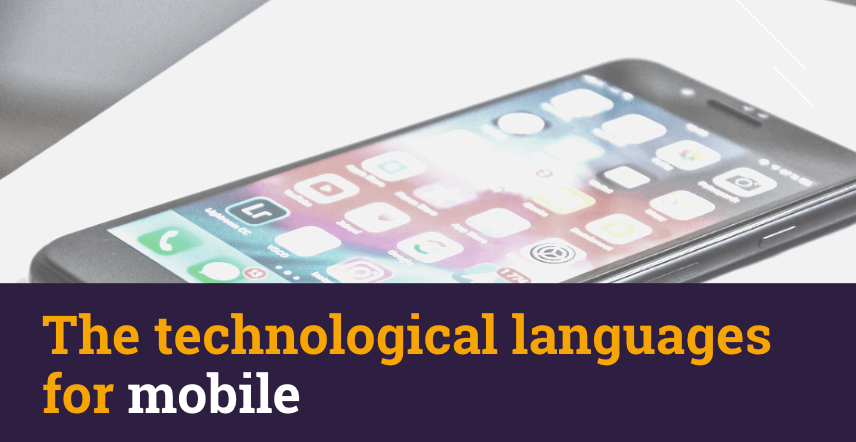When you want to develop a mobile app, you have to choose which language to work in. First of all, it must be clear what the user will use the app for: A game (visual and interactive)? Finances (fast and simple)? Tourism and routes (geopositioning)?… and in turn, be clear what the company needs for its business model: Data? Security?… There are many parameters that must be understood before choosing the code of the app such as functionality, purpose, degree of interaction and security, etc.
If you have a clear idea, you have an outline of the app at a functional level and you know the budget that accompanies the business model, we are ready to choose the technological language and start the development of the project.

Main languages for mobile phones
- JavaScript (and all its frameworks)
- Java
- Kotlin
- Swift
- Objective-C
- C# (.Net)
- C/C+ (with Unity)
Purpose of the main languages
- Multiplataform. In a world divided between Android and iOS, a JavaScript framework has appeared: React Native. This open source framework is used for all environments (it can support native Java and Swift code) and allows companies to dispense with the need to work in parallel with two squads of iOS and Android. This means that you only have to write a single version of your app, and it will work on iOS or Android. On the other hand, a native React programmer receives a substantially higher salary than other environments.
- Android environment. To develop Android apps the most used environment is Java although recently Kotlin is gaining much popularity. Kotlin is a static type language that increases productivity in development. In fewer lines of code, you get the same results. It is a modern language and still little known but that is clearly on the rise, especially since the Google Android team has recently announced that officially added support for this programming language.
- iOS envirnoment. The main current language for iOS is Swift. Although Objective-C was the original development language for iOS, Swift is an open source language with a very simple syntax and is also receiving great support from the iOs team (to identify errors, improve synchronization, etc.).
- Gaming. Everything that is gaming is usually related to C/C+ since Unity is a multiplafatorma video game engine among the most used but the most.

DIY
- React Native: This framework has numerous libraries and resources and despite being based on the Java Script language its learning is not as complex as its enormous practicality as it is valid for iOS and Android.
- Ionic: Ionic is another JavaScript framework, just like React Native. The difference between React Native and Ionic, is that React behaves like a native app of the device and Ionic behaves like a Web but as an app. It can be useful if you already know JavaScript or Angular (web languages) and want to make a simpler app very quickly.
- C++. C-based, C++ offers superior performance and greater resistance to reverse engineering. All platforms support C++ coding. It has many basic templates although learning this language is not so easy.
Try TalentFY in a Live Demo
Try our recruiting platform without compromise.
And if it doesn’t work for you, YOU DON’T PAY No small print.
Join our News
Subscribe and receive our most exclusive content and news every month
directly in your inbox.





